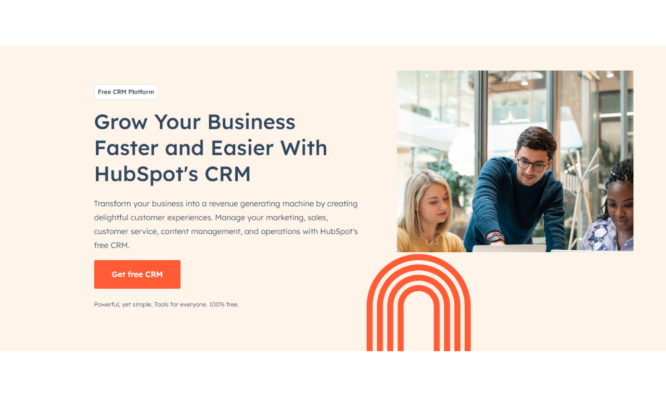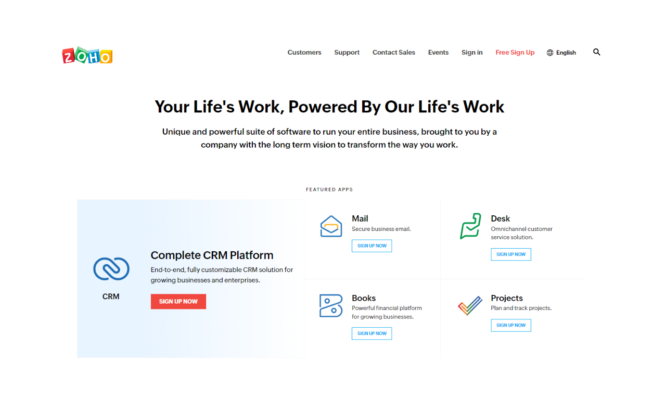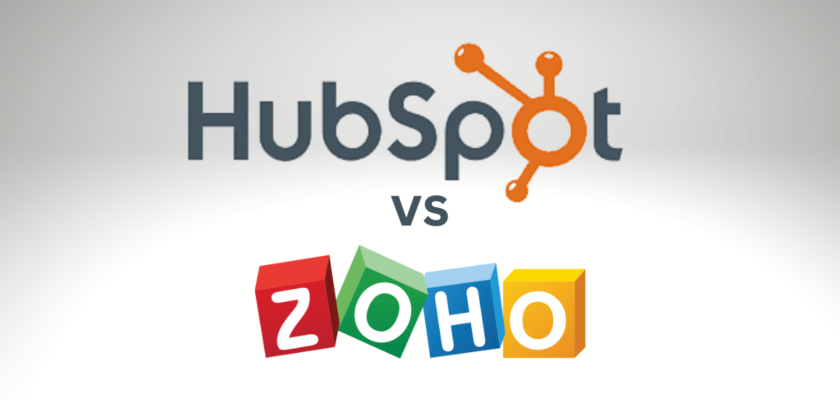Introduction
In today's digital age, businesses are continuously looking for ways to optimize their customer relationship management (CRM) processes. CRM software can help businesses to streamline their sales, marketing, and customer service activities.
HubSpot and Zoho are two of the most popular CRM solutions available in the market, each with its own unique set of features, pricing plans, and customer support options.
In this in-depth article, we will provide a detailed comparison of HubSpot vs Zoho CRM, covering their key features, integrations, and add-ons, pricing plans, customer support. By the end of this article, you should have a better understanding of which software may be the best fit for your business needs.
What is HubSpot?

HubSpot is an all-in-one inbound marketing, sales, and service software that is designed to help businesses attract, engage, and delight customers.
It's CRM software includes features such as contact management, deal tracking, task management, marketing automation, and customer support. HubSpot's software is known for its ease of use, intuitive interface, and powerful reporting capabilities.
Read more: The Ultimate Guide to HubSpot Inbound Marketing and Sales Solutions
What is Zoho?

Zoho CRM is a part of the larger suite of Zoho applications, including tools for sales, marketing, and productivity. Zoho CRM offers a comprehensive set of features that enable businesses to manage their sales pipeline, automate marketing campaigns, and provide excellent customer support. It has a flexible pricing model and a range of integrations with other Zoho applications as well as third-party tools.
Key Features of HubSpot vs Zoho
When it comes to choosing a HubSpot vs Zoho CRM solution, it's important to consider the most important features that will help you manage your customer relationships effectively.
| HubSpot | Zoho | |
| Contact Management | Create/manage contact records and segment them based on criteria. | Manage contacts with complete contact history |
| Sales Pipeline Management | Create/manage deals, track progress, and get reporting/forecasting tools. | Customizable sales pipeline with deal tracking and sales forecasting |
| Marketing Automation | Create/automate email campaigns, lead capture forms, landing pages, and social media monitoring. | Email and social media marketing tools, web forms, and landing pages |
| Reporting and Analytics | Access reports including deal forecasts, sales performance, and a customizable dashboard. | Reporting with a customizable dashboard for tracking key metrics and data insights |
| Customer Support | Create/manage tickets, live chat, feedback surveys, knowledge base, and community forum. | Ticket management, live chat, phone support, and customer portal for submitting requests. |
If you are looking for just the best email marketing solution then we have listed the 7 Best Email Marketing Platforms
Integrations and Add-ons; HubSpot vs Zoho
One of the main advantages of using a CRM solution is the ability to integrate with other software tools and services to enhance your overall workflow. Both HubSpot and Zoho offer a range of integrations and add-ons, allowing users to connect with other popular tools and platforms.
HubSpot Integrations and Add-ons
Integrations:
- Email marketing tools like Mailchimp, Campaign Monitor, and Constant Contact
- Social media management tools like Hootsuite, Buffer, and Sprout Social
- E-commerce integrations like Shopify, WooCommerce, and Magento
- Payment processing options like Stripe and PayPal
- CRM integrations like Salesforce and Zoho
- Analytics tools like Google Analytics and Databox
- Video hosting platforms like Wistia and Vidyard
Add-ons:
- Sales Hub for advanced sales features and analytics
- Marketing Hub for advanced marketing automation and analytics
- Service Hub for customer service tools and analytics
- CMS Hub for website design and management
- App Marketplace for various third-party apps and integrations
- Custom objects and fields for creating custom data types and fields within HubSpot.
Zoho Integrations and Add-ons
Integrations:
- Email marketing tools like Mailchimp and Constant Contact
- Social media management tools like Hootsuite and Buffer
- E-commerce integrations like Shopify and Magento
- Payment processing options like PayPal and Authorize.Net
Add-ons:
- Zoho Books for accounting
- Zoho Desk for customer support
- Zoho Campaigns for email marketing
When considering the available integrations and add-ons for each software, it's important to consider how they can benefit your business. For instance, integrating with a social media management tool can help you streamline your social media marketing efforts, while integrating with an e-commerce platform can help you manage your online store more effectively.
In summary, both HubSpot and Zoho offer a range of integrations and add-ons that can help users customize and enhance the functionality of their CRM solution. The available integrations and add-ons will depend on your specific business needs, so it's important to evaluate each software's offerings and determine which ones will be most beneficial to your workflow.
Pricing of HubSpot vs Zoho
When it comes to selecting a CRM solution, pricing is a critical consideration. Both HubSpot and Zoho offer a range of pricing plans that cater to different business sizes and needs. In this section, we will provide an overview of the different pricing plans available for HubSpot and Zoho, compare the cost and value of each plan, and discuss which plan may be the best fit for different business sizes and needs.
HubSpot Pricing
HubSpot offers a range of pricing plans, including a free plan, starter plans, professional plans, and enterprise plans.
- Free Plan: The free plan is suitable for startups and small businesses that are just starting with CRM.
- Starter Plans: The starter plans range from $50 to $1,275 per month and is suitable for small and growing businesses that require more features and functionalities.
- Professional Plans: The professional plans range from $1,200 to $4,200 per month and are suitable for mid-sized businesses with advanced sales, marketing, and service needs. The enterprise plans are designed for larger businesses with complex requirements and start from $4,200 per month.
Zoho Pricing
Zoho CRM also offers a range of pricing plans, including a free plan, standard plans, professional plans, and enterprise plans.
- Free Plan: The free plan is suitable for startups and small businesses that have basic CRM needs.
- Standard Plans: The standard plans range from $14 to $45 per user per month and are suitable for small businesses that require more advanced features and integrations.
- Professional Plans: The professional plans range from $45 to $75 per user per month and are suitable for mid-sized businesses that require more advanced marketing automation and reporting.
- Enterprise Plans: The enterprise plans are designed for larger businesses with complex needs and start from $90 per user per month.
Cost and Value Comparison
When comparing the cost and value of each plan, it is important to consider the features and functionalities offered by each plan, as well as the level of support and training provided. HubSpot offers a more comprehensive set of features, including advanced marketing automation, sales pipeline management, and customer service tools, which can provide a greater return on investment for businesses with more complex needs. Zoho, on the other hand, offers more affordable pricing and a wider range of integrations, making it an attractive option for smaller businesses that require more basic CRM functionalities.
Best Fit for Different Business Sizes and Needs
In general, HubSpot is better suited for larger businesses that require more advanced CRM features, whereas Zoho is better suited for smaller businesses that require a more affordable and flexible CRM solution. However, it is important to evaluate each CRM solution based on the specific needs and budget of your business, as well as the level of support and training provided by each vendor.
In conclusion, both HubSpot and Zoho offer a range of pricing plans that cater to different business sizes and needs. By evaluating the cost and value of each plan, as well as the features and support offered, businesses can make an informed decision about which CRM solution is best suited for their unique needs.
Customer Support: HubSpot vs Zoho
Customer support is an essential aspect to consider when selecting a CRM solution. Both HubSpot and Zoho offer a range of support options, including phone and email support, live chat, and knowledge base and documentation. In this section, we will provide a comparison of the customer support options available in HubSpot vs Zoho, as well as a discussion of the quality of support provided by each company.
HubSpot Customer Support
HubSpot provides excellent customer support with a dedicated team of support specialists available to assist users with any issues they may encounter. HubSpot offers phone and email support, as well as live chat support for its professional and enterprise customers. Additionally, HubSpot has a comprehensive knowledge base and documentation center, which provides detailed articles, tutorials, and videos to help users get started with the platform and troubleshoot any issues.
Zoho Customer Support
Zoho also offers strong customer support with phone and email support available for all its users. Additionally, Zoho provides live chat support for its enterprise customers. Zoho also has a comprehensive knowledge base and documentation center, which provides a range of articles, tutorials, and videos to help users get started with the platform and troubleshoot any issues.
Quality of Support
Both HubSpot and Zoho offer high-quality customer support, with quick response times and knowledgeable support staff. However, HubSpot provides more options for live support, including phone and live chat support for all its paid plans, whereas Zoho only provides live chat support for its enterprise customers. Additionally, HubSpot provides more in-depth documentation and resources, which can be especially helpful for new users who are just getting started with the platform.
Conclusion
In this article, we conducted an in-depth analysis of two of the top CRM solutions in the market, HubSpot vs Zoho. We compared various aspects of each software, including its key features, user experience, and pricing.
Based on our analysis, we recommend HubSpot for businesses that prioritize ease of use, marketing automation, and sales pipeline management. Meanwhile, Zoho is a good fit for businesses that require more advanced customization and integrations, and have complex sales processes. However, the best CRM solution for your business will depend on your specific needs, budget, and goals.
In conclusion, selecting the right CRM software is an important decision for any business. HubSpot and Zoho are both excellent options, and each has its strengths and weaknesses. We hope this article has provided you with a clearer understanding of these two popular CRM solutions, and that you can use this information to make an informed decision. If you require more information or guidance, both HubSpot and Zoho have additional resources, such as webinars, tutorials, and guides, available on their websites.




